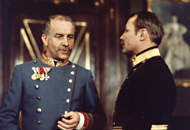The Tale...
Hofmannsthal is very much concerned with how the world is perceived in this story. In the beginning the merchant's son sees the world through his many belongings (including his servants). Yet another thing to note here is that he feels "watched" by them at the same time. When he receives the letter everything switches on him and he goes off into the "real world" on his own. Now he purchases things for their personal/sentimental value, which seems to be different from his other belongings he has his house cluttered with. He begins to get things based on his experiences in the world versus his old method of getting things to experience the world. This change is an extreme one and very important.
Janik and Toulmin say "pre-existence" is "that state, [where] all souls, all minds are one; and one with the stuff of the universe" (pg 113)
Upon the receipt of the letter the merchant's son begins to uncover new meaning in the world, and in essence become a more whole person. This strikes a chord with the idea of pre-existence, especially because after achieving this change towards wholeness he dies and becomes one with the "stuff of the universe". Another interesting point is that after dieing he takes on the "menacing" characteristics/looks as the horse that killed him, this seems to be yet another circular pattern towards the unity of all things that Hofmannsthal seems to be creating.



2 comments:
I like your analysis, and I definitely agree with you! I think that the way the merchant's son collects artifacts is a way to create a mini-, tangible universe of his own. And also, the way he encorporates his experience/memory into the basis of his collection ties back to the idea of universal mind/knowledge of pre-existence, because (in Platonism) "remembering" that knowledge is a step toward higher being (and beauty).
I appreciate that you brought up the idea of "pre-existance" as I agree that it can be very explicitly applied to the Merchant Son's world prior to the arrival of the letter. I also think, however, that it may be a misuse of words to assert that the Merchant's Son becomes a "whole person" as his motivations and want for beauty never really change. Though he does discover that there is more to the world than just his home, the Merchant's Son remains true to his earlier outlined character that is only concerned with aesthetics. Even before his death, he is afraid of the horse becuase it is ugly. The fact that this horse then kills him seems to me a plot device of Hofmansthal's to justify his fear of the ugly.
Post a Comment